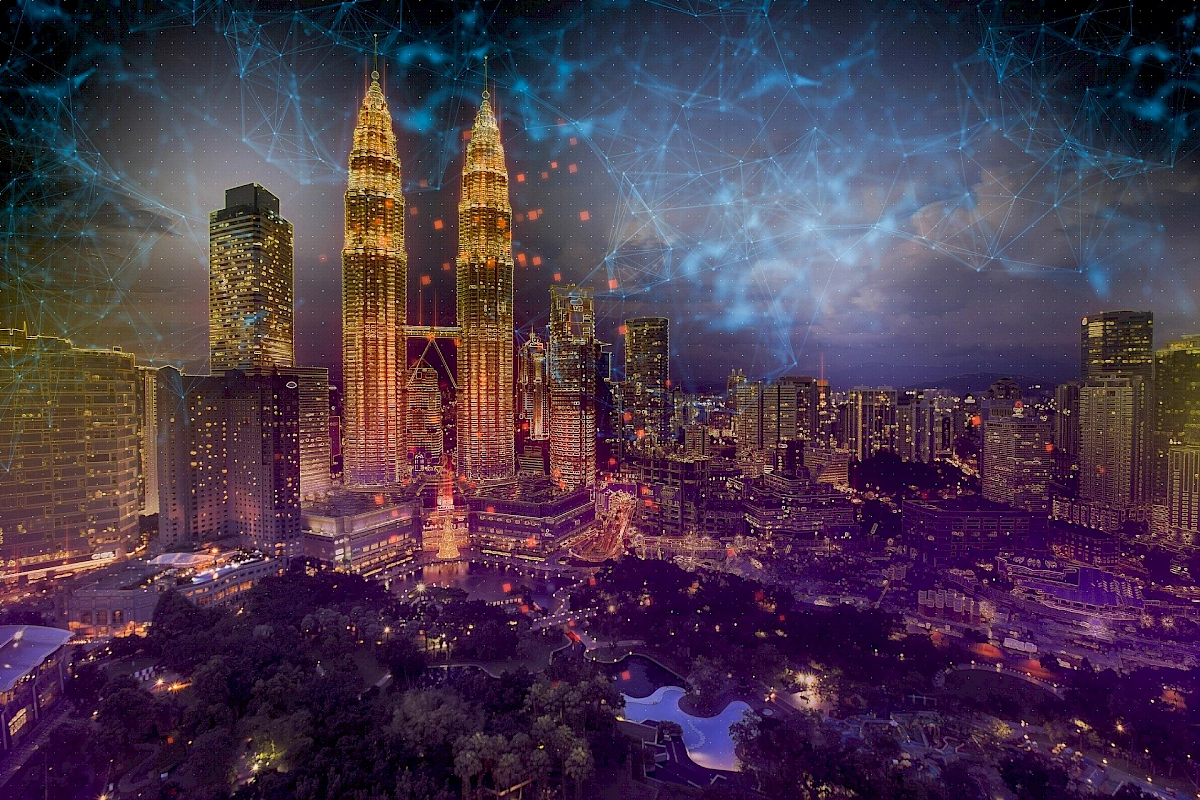Digital twin of traffic
A "digital twin in traffic" is as complete an image as possible of the real traffic situation, but not real, but digital. This image should have a high degree of precision and be able to keep up with the dynamics of traffic. This would contribute significantly to the optimisation and control of traffic. In addition, traffic safety and the general supply of information can be increased. This is especially beneficial for assistance systems, as more and better data will make them smarter and pave the way for autonomous driving.
Traffic data is collected by radars, cameras and lidars. This data can be analysed to identify objects such as pedestrians, cyclists, cars, etc. To enable real-time mapping of traffic, the data needs to be delivered via communication technology. Mobile radio at the level of 5G is considered the most suitable technology here, but special WLAN adapted to urban traffic is also available.
 A city at night with representation of networking in the night sky
A city at night with representation of networking in the night sky© https://pixabay.com/de/illustrations/stadt-lichter-horizont-geb%c3%a4ude-4181971/
Examples
Providentia++ research project
The better sensors from vehicles and infrastructure are networked, the more seamlessly the traffic area can be recorded. This ultimately benefits not only the motorist, but also all other road users.
https://innovation-mobility.com/sensor-daten-digitaler-zwilling-wie-geht-das/
CARLA software for live visualisation of traffic
CARLA was developed from scratch to support the development, training and validation of autonomous driving systems.
https://carla.org/
SmartOpenHamburg
Prof. Clemen: "One of the main goals of SmartOpenHamburg is to make Hamburg a functioning city with as little driving and parking individual traffic as possible.
https://smartopenhamburg.de/
Münster is now a Smart City model city
The city of Münster has now received 9.5 million euros in funding from the Federal Ministry of the Interior for Construction and Home Affairs (BMI). The money will be used, for example, to realise twelve selected project ideas. The funded projects are briefly described below:
Young Smart City: #stadtsache 2.0: Involving and empowering children and young people for the Smart City. Equipped with mobile devices, they explore their surroundings with a focus on topics of a digital city.
Leezenflow for the city region: Further development of the Green Wave assistant "Leezenflow" and installation on the 14 cycle routes of the Münster city region.
Energy Heroes: Our Climate 2030: Development of a digitally supported educational & information offer on the topic of climate protection and renewable energies.
Idea farm: open source solution enabler: Support and stabilisation of "open" civic ideas and digital projects through a sponsorship model.
Werkraum Innenstadt: Increasing the attractiveness of the city centre by attracting and utilising ideas, start-ups and projects from the digital economy.
Holistic city logistics: With digital solutions for optimal city logistics. Development of digitally supported measures to make local delivery routes short and environmentally friendly.
Funkhaus 2.0: Localising the Digital: Developing a "third place" for applying and trying out techniques and digital solutions to acquire media and digital literacy.
Smart neighbourhoods for connected neighbourhoods: Developing and implementing neighbourhood-based digital projects for new urban neighbourhoods such as Oxford and York.
Small box, big impact: Feel.Measure.Participate: Development of an area-wide and participatory network of measuring stations to collect environmental data.
NICO: NetzInfrastrukturCOckpit: Development of a central data platform and a digital twin for urban infrastructures.
Data-Leeze: smart cycling city Münster: Collection and analysis of data for the further development and expansion of the cycling infrastructure.
BOOST: accelerate loop and bus traffic: Use of intelligent communication technologies to optimise local public transport.
Further info at: https://smartcity.ms/
